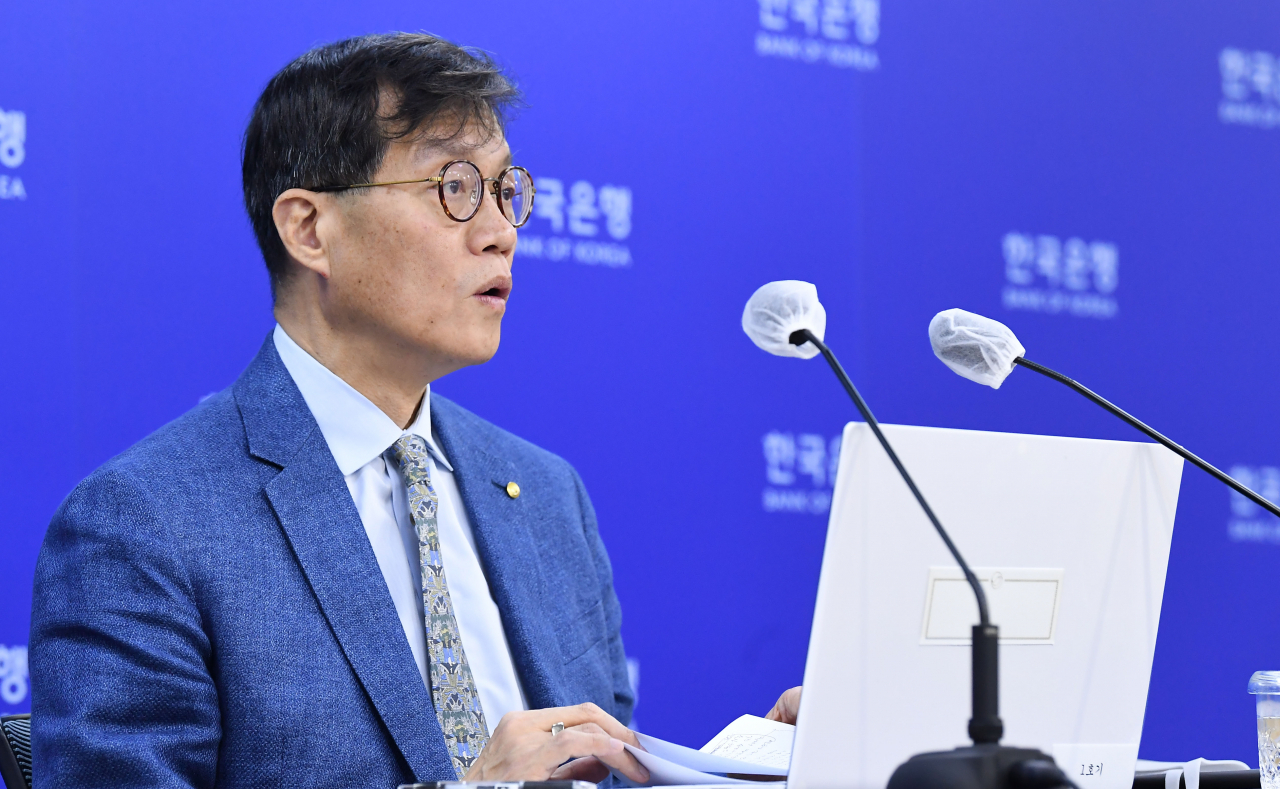BOK expects 2022 inflation to grow faster than anticipated, hit highest in 14 years
By YonhapPublished : June 21, 2022 - 09:41

South Korea's central bank said Tuesday it expected inflation to grow at a faster pace than previously anticipated and possibly hit the highest level in 14 years for this year as price pressures are mounting from rising demand and a tight supply.
In an apparent forward guidance, Bank of Korea (BOK) Gov. Rhee Chang-yong said the central bank will carry out its monetary policy with a priority on price stability until inflation ends its upward trend, hinting that it will likely continue to raise its key policy rate in the months to come.
"The future price trend is expected to surpass our forecast made in May given changes in various circumstances, including accelerating international oil prices," the BOK said in a biannual report on inflation. "There is a possibility that this year's price growth exceeds the level (of 4.7 percent) in 2008."
"Going forward, consumer prices will likely continue their upward move by staying over a 5 percent rise for the time being as inflation pressures are mounting from both the supply and demand sides," it added.
The updated projections came about a month after the BOK sharply revised up its inflation forecast for this year from 3.1 percent to 4.5 percent at a monetary policy board meeting.
South Korea has been facing rising inflation pressures from rebounding consumption from the pandemic, high-flying crude oil and commodity prices amid supply chain disruptions worsened by the ongoing war in Ukraine.
The country's consumer prices jumped 5.4 percent on-year in May, the fastest rise in almost 14 years. The BOK analyzed that external factors, such as rising energy and food prices, accounted for more than half of the May tally.
In a press briefing Tuesday, Rhee said market consensus has been that inflation could peak in the third quarter of this year but the outlook remains muddy amid heightened uncertainty at home and abroad.
"Compared with a month earlier, inflation has been under more upward pressure, while the economy has been under more downward pressure," Rhee told reporters.
"With prices growing persistently and fast, monetary policy should be carried out centering on addressing inflation until its upward trend is dampened," he added.
Rhee still dismissed concerns the country might go into stagflation, saying the economy for this year will highly likely grow at a faster pace than what is deemed to be its potential growth rate of 2 percent. Stagflation refers to a mix of slumping growth and high inflation.
In a bid to tamp down inflation, the BOK hiked its policy rate by a quarter percentage point to 1.75 percent in May, the fifth increase since August last year.
Market watchers say the BOK could consider more aggressive rate hikes down the road to fight inflation.
The BOK is also under growing pressure to further raise the rate following the US Federal Reserve's 0.75 percentage-point increase last week, which prompts concerns that a rate reversal between the two countries could lead to capital flows out of South Korea's financial markets.
Asked whether the BOK is considering making a big step with a 0.5 percentage-point rate increase, Rhee said that such a decision will be made not based on such single factors as inflation but in a comprehensive way by gauging its impact on the economy, exchange rates and financial burdens on people.
Rhee earlier said all options, including a big rise, remain on the table, when it comes to the monetary policy. The BOK has not raised its interest rate by 0.5 percentage point or higher at a time, as it usually resorts to quarter percentage-point increments when adjusting the monetary policy.
The BOK will hold its next rate-setting meeting July 13. (Yonhap)







![[From the Scene] Monks, Buddhists hail return of remains of Buddhas](http://res.heraldm.com/phpwas/restmb_idxmake.php?idx=644&simg=/content/image/2024/04/19/20240419050617_0.jpg&u=20240419175937)








![[From the Scene] Monks, Buddhists hail return of remains of Buddhas](http://res.heraldm.com/phpwas/restmb_idxmake.php?idx=652&simg=/content/image/2024/04/19/20240419050617_0.jpg&u=20240419175937)

![[KH Explains] Hyundai's full hybrid edge to pay off amid slow transition to pure EVs](http://res.heraldm.com/phpwas/restmb_idxmake.php?idx=652&simg=/content/image/2024/04/18/20240418050645_0.jpg&u=20240419100350)

![[Today’s K-pop] Illit drops debut single remix](http://res.heraldm.com/phpwas/restmb_idxmake.php?idx=642&simg=/content/image/2024/04/19/20240419050612_0.jpg&u=)